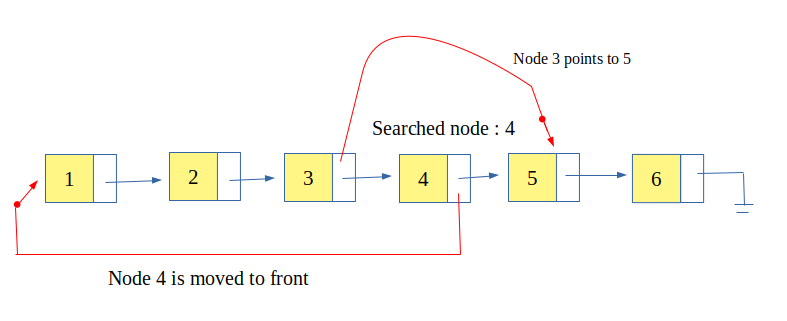La lista autoorganizada es una lista que se reorganiza o se reorganiza para un mejor rendimiento. En una lista simple, un elemento a buscar se busca de manera secuencial, lo que da la complejidad temporal de O(n). Pero en un escenario real, no todos los elementos se buscan con frecuencia y, la mayoría de las veces, solo unos pocos elementos se buscan varias veces.
Por lo tanto, una lista autoorganizada usa esta propiedad (también conocida como localidad de referencia ) que trae los elementos usados con más frecuencia al principio de la lista. Esto aumenta la probabilidad de encontrar el elemento al principio de la lista y los elementos que rara vez se usan se empujan al final de la lista.
En el método Mover al frente , el elemento buscado recientemente se mueve al frente de la lista. Por lo tanto, este método es bastante fácil de implementar, pero también mueve los elementos que se buscan con frecuencia al frente. Este movimiento de elementos buscados con poca frecuencia al frente es una gran desventaja de este método porque afecta el tiempo de acceso.


Ejemplos:
Input : list : 1, 2, 3, 4, 5, 6
searched: 4
Output : list : 4, 1, 2, 3, 5, 6
Input : list : 4, 1, 2, 3, 5, 6
searched : 2
Output : list : 2, 4, 1, 3, 5, 6
Implementación:
CPP
// CPP Program to implement self-organizing list
// using move to front method
#include <iostream>
using namespace std;
// structure for self organizing list
struct self_list {
int value;
struct self_list* next;
};
// head and rear pointing to start and end of list resp.
self_list *head = NULL, *rear = NULL;
// function to insert an element
void insert_self_list(int number)
{
// creating a node
self_list* temp = (self_list*)malloc(sizeof(self_list));
// assigning value to the created node;
temp->value = number;
temp->next = NULL;
// first element of list
if (head == NULL)
head = rear = temp;
// rest elements of list
else {
rear->next = temp;
rear = temp;
}
}
// function to search the key in list
// and re-arrange self-organizing list
bool search_self_list(int key)
{
// pointer to current node
self_list* current = head;
// pointer to previous node
self_list* prev = NULL;
// searching for the key
while (current != NULL) {
// if key found
if (current->value == key) {
// if key is not the first element
if (prev != NULL) {
/* re-arranging the elements */
prev->next = current->next;
current->next = head;
head = current;
}
return true;
}
prev = current;
current = current->next;
}
// key not found
return false;
}
// function to display the list
void display()
{
if (head == NULL) {
cout << "List is empty" << endl;
return;
}
// temporary pointer pointing to head
self_list* temp = head;
cout << "List: ";
// sequentially displaying nodes
while (temp != NULL) {
cout << temp->value;
if (temp->next != NULL)
cout << " --> ";
// incrementing node pointer.
temp = temp->next;
}
cout << endl << endl;
}
// Driver Code
int main()
{
/* inserting five values */
insert_self_list(1);
insert_self_list(2);
insert_self_list(3);
insert_self_list(4);
insert_self_list(5);
// Display the list
display();
// search 4 and if found then re-arrange
if (search_self_list(4))
cout << "Searched: 4" << endl;
else
cout << "Not Found: 4" << endl;
// Display the list
display();
// search 2 and if found then re-arrange
if (search_self_list(2))
cout << "Searched: 2" << endl;
else
cout << "Not Found: 2" << endl;
display();
return 0;
}
List: 1 --> 2 --> 3 --> 4 --> 5 Searched: 4 List: 4 --> 1 --> 2 --> 3 --> 5 Searched: 2 List: 2 --> 4 --> 1 --> 3 --> 5
Publicación traducida automáticamente
Artículo escrito por shubham_rana_77 y traducido por Barcelona Geeks. The original can be accessed here. Licence: CCBY-SA